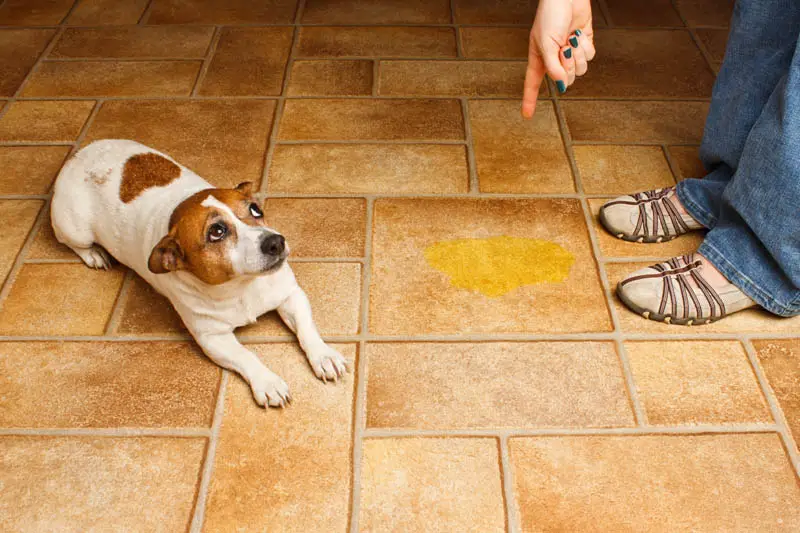How Long can Dogs Hold their Pee? (How Long Is Safe?)
As a first-time dog owner you might need to travel long distance with your dog, leave them inside your house for an extended period, or maybe you’re wondering how to monitor them to make sure they haven’t developed a urinary problem.
We all know how uncomfortable (or even painful) it can be to hold on for too long when you really need to pee, and would hate to put our dog through that discomfort by forcing them to hold on for too long.
There are a number of factors to consider including age, sex, physical activity, breed, body size, etc. When you’re at home and your dog can go when they want, observe them to help determine their urinary frequency, as this will help give you a baseline.
As part of your casual observation of your dogs habits, take note of how much water they are drinking also, as obviously drinking more water will increase the frequency of urination.
In this article we delve into:
- How often dogs pee (how long they hold their pee).
- Solutions to encourage normal urinary frequency.
- Causes and possible solutions of frequent and infrequent urination in dogs.

How Often Do Dogs Pee?
Generally, a healthy dog pees three to five times a day. Most adult dogs pass urine after 8 to 10 hours depending on their body size, health conditions, and sex, etc.
A young puppy is more likely to pee more frequently since they have a small bladder compared to that of an adult dog.
Senior dogs are likely to pee more often not only due to their age factor, but also according to their prevailing health conditions.
A well-hydrated dog will likely pee more often as opposed to a dehydrated dog. Keep your canine friend well-hydrated at all times.
How Long Can Dogs Hold Their Pee?
Although each dog has its own individual tendencies, generally they can hold urine for up to 8 to 10 hours. However, they should not exceed 8 hours before passing urine.
Remember, a dog pees 10-20 ml for each pound of their weight.
The length of time a dog can hold their pee also depends on a number of factors that include their physical activity, age, breed, etc.
A large dog breed that is physically active can hold urine for longer compared to small non-active dogs, and can be approximately 10-12 hours without causing health problems when occurring on the odd occasion.
If your dog has to hold on for a long period like this, it’s best to ensure that it doesn’t happen often.
As a dog owner it is important to potty-train your canine to pass urine every 8 hours or less, since holding urine for long could be detrimental to their health.
Look out for signs that your dog is ready to pass out urine and respond accordingly.
Wondering how long dogs can go without water? Find out in this article.
Reasons Not To Let Puppies Hold Their Pee For Too Long
Even though dogs can hold urine for up to 10 hours or 12 hours (for some breeds), it is not advisable to regularly have them hold urine for this long.
It is not only uncomfortable for them but also poses certain health risks for your adorable canine.
Some of the possible health risks include:
Bacterial Infection.
Your canine may suffer from the likelihood of contracting urinary tract infections(UTI) as a result of the increased accumulation of bacteria, and can lead to the development of kidney stones.
Cancer
A dog could develop certain types of cancers such as bladder cancer as a result of the interaction of the body cells and the concentrated carcinogens present in urine kept for too long.
A common symptom of urinary cancer is recurring UTI’s and can be fatal within a short period if not treated promptly.
If you notice your dog experiencing pain when urinating, ensure you get their health checked immediately by a vet.
Incontinence
Dogs can also suffer from incontinence as a result of their bladder failing to hold urine after several years of continually holding their pee for too long.
Treatment of incontinence is mainly through surgical processes; Cystourethropexy and Colposuspension.
Symptoms of Urinary Tract Infections (UTI’s)
As a dog parent it is important to be on alert for any sign of urinary infections especially if your dog often holds urine for an extended period of time.
Potty-trained canines tend to hold urine for too long until their master gives them a green light or prior to ‘accidents’. Dogs are often so obedient to their owners that they will suffer discomfort and pain to ensure they don’t upset their human parents.
Common UTI Symptoms
- Increased urinary frequency or inability to urinate.
- Discomfort when peeing.
- Presence of blood or fluid in your dog’s pee.
- Dog ‘accidents’ in the house/lack of bladder control.
- Weight loss.
- Lethargy and vomiting.
- Lack of appetite.
If you spot any of these signs in your dog, you should promptly consult your veterinarian for clinical diagnosis and treatment.
Remember even a small symptom could be a sign of a more complicated health condition.
Nonetheless, it is easy to manage UTI’s in dogs using particular antibiotics that inhibit the growth of bacteria, and these are easily provided by a vet.
How To Prevent Your Dog From Holding Urine For Long Periods
With our busy life schedules at work sometimes it gets difficult managing our dogs’ urinary habits.
At the same time, we do not want to see our best friends suffer from health conditions that result from holding urine for long.
Invest In A Doggie Lawn
If you are unable to take your pup out in the backyard to relieve themselves often then you might consider investing in a doggie lawn.
It is an eco-friendly real grass that lets your dog pee in it, at their own schedule in the house or even outside. Doggie lawn is not only easy to maintain but neutralizes odor as well.
Lawn trays are available to serve all dog-sizes, and also lasts for weeks. Many dogs use them readily, as this is a natural place for them to pee.
Get A Dog Sitter
Employing a dog sitter is a preferable choice especially if you want your doggy to have a companion during the day when you are away.
A dog sitter will ensure that your canine pees regularly at recommended intervals by taking them out in the backyard, or for a walk in a place where they can do their business.
In addition they can engage your pup in healthy play activity to help them keep fit while outside.
Doggy Day Care
If you are away from your house for the better part of the day and would love your dog to have an extra-care, then consider registering your pup in a day-care.
There is an increasing number of doggy day-care centers owing to the demand for such services. Your canine friend will enjoy the utmost care and won’t have to hold urine for long.
Frequent Urination In Dogs
Are you worried about your dog’s urination frequency? Well, a number of behavioral problems as well as health conditions can contribute to frequent urination in dogs.
Some behavioral problems such as excitement or fear can lead to loss of bladder control hence accidental pee.
On the other hand, some health issues may contribute to frequent urination. They include diabetes, kidney failure, tumor, liver disease, hormonal disorders, polyuria, and pollakiuria.
Other causes include age and the effects of medication.
Solutions To Frequent Urination In Dogs
Determining the underlying cause of frequent urination is the first step to finding a possible solution.
For instance, if it is a behavioral problem emanating from sudden excitement, you may want to train your canine friend to calm their emotions by engaging in some relaxation exercises.
If your dog is overly excited when you come home, just remain calm and quiet, use a reasurring low tone of voice, and take them outside straight away. This way your dog will learn to remain calm, and also that it can go outside the moment you arrive home each day.
Dogs can also pee when frightened or being submissive. This can occur due a number of reasons such as:
- Puppies often pee submissively, and this can remain into adulthood.
- If they have been frequently reprimanded for peeing, and the negative behavior becomes reinforced.
- When they hear loud noises, or scolded for poor behavior.
- Due to mistreatment as puppies.
You can normally change their behavior through positive reinforcement training. Use a calm reassuring voice, praise them and give them treats for good behavior, don’t use a loud voice with them, and don’t play with them too roughly.
After some time their behavior should gradually change to reduce or halt their peeing problem.
Conversely, if it is a potential health-related issue, you should consult your veterinarian for clinical examination and treatment. With early diagnosis, your dog can often be easily treated.
Dogs With Infrequent Urination: What To Do
You might find that your dog seems unable to pee but shows no sign of pain. Infrequent urination may be initial symptoms of dehydration. As a dog parent, you will need to offer them lots of water as well as electrolytes to keep them hydrated.
On the other hand, your dog may face infrequent urination but exhibit pain. This could be a case of an underlying health concern. Visit your veterinarian doctor to clinically examine your dog.
Some of the health conditions that may cause infrequent urination among dogs include kidney stones and urinary tract infections (UTI’s).
FAQs
How long is too long for a dog to go without peeing?
A healthy dog can take up to 6-8 hours before relieving themself. However, under unavoidable circumstances, they can hold up urine for up to 10-12 hours.
Can dogs hold pee overnight?
Yes. Canines rarely require bathroom breaks at night. So you do not have to wake up to take them out to pee.
How often should your dog pee?
That would depend on several factors such as age, body size, and breed. Generally, an adult dog should pee at least 3-5 times on a daily basis. For young and smaller breeds, the frequency increase since their small bladder can’t hold much urine.
What happens if a dog holds its urine for too long?
If this happens regularly they are likely to suffer from urinary tract infections that if not managed promptly can lead to urinary stones.
What is the hardest dog breeds to potty train?
There are a number of dog breeds that will take lots of patience to potty train. They include Bichon Frise, Dalmatians, Afghan Hounds, Dachshunds, and Jack Russell Terriers.
How long can puppies hold their urine?
Puppies urinate frequently, therefore you should offer them several bathroom breaks as well as potty train them, otherwise your cute new puppy will likely have several ‘accidents’.
Generally, a two-month-old puppy can urinate in intervals of three hours.
Conclusion
Generally, dogs can hold their pee for 8-10 hours and in some cases up to 12 hours depending on the breed. However, it is always advisable not to allow your dog to hold urine for more than 8 hours.
When dogs hold urine regularly for long periods they are likely to suffer from mild to severe health conditions that include bacterial infection, UTI’s, and bladder cancer, etc.
Remember, normal urination frequency is a great sign of the healthy condition of your dog. Always observe your dog and seek clinical assistance as deemed necessary.
Ensure that your dog exercises normal urination frequency even when you are away from the house. Invest in a doggie lawn, employ a dog sitter, or enroll them in a doggy day-care.
Read More About :



